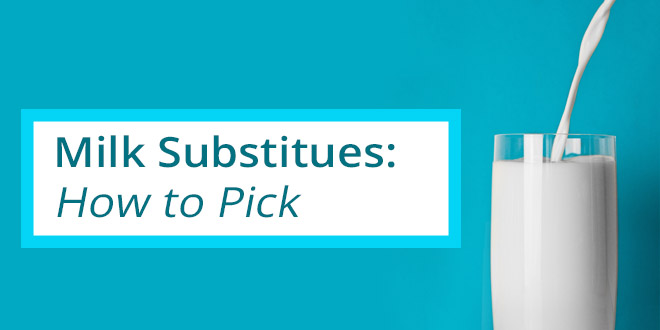Milk Substitutes: How to Choose
Jun 06, 2016

By Emily Saunders
In recent years more and more people have figured out that their bodies do not love cow’s milk. We are becoming more and more aware of both food allergies and sensitivities and unfortunately dairy is the 2nd most common food allergen. Many people misunderstand food sensitivities and think that consuming an allergenic food will cause an anaphalactic response like hives, vomiting or extreme digestive distress. This is often not the case. Dairy in particular is heavily related to nasal drip, gas, bloating, constipation, acne, eczema and weight-loss resistance. That’s right- I have witnessed pounds literally melt off of women who simply removed whey protein from their diet.
Today I want to share with you some of my favorite options for milk substitutes. Before we get started a few tips:
- Look for products that have very few ingredients and are free from Carrageenan. Here is a great resource for comparing ingredients in brands of almond milk and HERE is a resource for coconut milk.
- ALWAYS choose the unsweetened varieties only.
- You can make your own! Nut milks are super duper easy to make with a high powered blender like a Vitamix. Soak 1 cup raw almonds overnight in water. Drain water and add to Vitmaix. Add 3 cups filtered water. Blend well starting slowly and increase speed until pulp is very fine. Use a nut milk bag like this one to strain. Store in the refrigerator in a jar. Enjoy!
OK now that we have that down let’s talk more about which varieties to choose. There are more and more options all the time which is great for those with lots of food sensitivities.
- Almond Milk: Almond milk is available at just about ANY grocery store. It’s flavor is light and nutty and it works well in most recipes except the nutty flavor can overpower in very light flavored recipes. Almonds are high in Vitamin E, magnesium, potassium, zinc, iron, fiber and calcium. Almond milk is naturally full of nutrients and doesn’t need to be fortified.
- Coconut Milk: Thicker and creamier than almond milk, some people LOVE coconut milk. Great for those with nut sensitivities and for those who prefer a different flavor, coconut milk is also widely available. Made from grated coconut meat, which help give it a natural, creamy thickness, coconut milk is loaded with medium-chain triglycerides (a type of easily-digested healthy fat that helps with fat loss). CANNED coconut milk is also a great substitute for heavy cream and condensed milk in recipes.
- Cashew Milk: The new kid on the block, cashew milk is gaining in popularity and is more widely available than ever before. It’s got a more mild flavor than almond milk, but is still slightly nutty. Many love it in beverages and as a creamer substitute. Made by blending water-soaked cashews water, this subtly-flavored beverage is a good source of fiber, antioxidants, copper and magnesium.
- Flax Milk: Rich and creamy yet super light, flax milk is another lightly flavored beverage that is great in beverages. It’s available at specialty groceries but gaining ground. Each serving has just 25 calories and 1200mg of Omega-3’s from cold-pressed flax oil. In some recent taste tests flax milk actually WON in a flavor contest conducted on those who usually drink cows milk.
- Hemp Milk: Similar in taste and texture to flax milk, hemp is rich in heart-healthy omega-3 fatty acids and naturally carries 10 essential amino acids, making it a good vegan source of protein. The natural, unobtrusive flavor makes it a good option for baked goods and side dishes like mashed potatoes and cauliflower.
There are of course other varieties out there like quinoa milk and more that are gaining ground, but they are difficult to find so we aren’t talking about them here. I DO want to mention a couple of milks that I’m NOT a fan of…
- Soy Milk: Soy is another common allergen and almost always genetically modified. I generally recommend avoiding soy as much as possible so choosing another milk alternative is a great idea.
- Rice Milk- Rice milk is often higher in sugar due to the way it’s processed. It also has less protein and more carbohydrates than other alternatives. That said- it can be good for baking since it holds up to high heat. If you’re looking to bake a dairy-free cake that’s not supposed to be healthy then give it a shot.
Lorem ipsum dolor sit amet, consectetur adipiscing elit. Cras sed sapien quam. Sed dapibus est id enim facilisis, at posuere turpis adipiscing. Quisque sit amet dui dui.
Stay connected with news and updates!
Join our mailing list to receive the latest news and updates from our team.
Don't worry, your information will not be shared.
We hate SPAM. We will never sell your information, for any reason.

